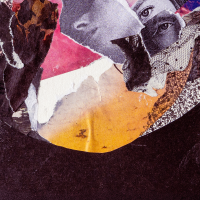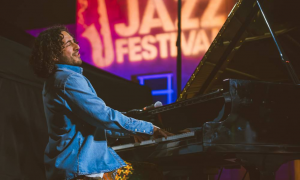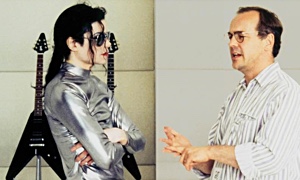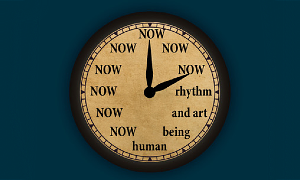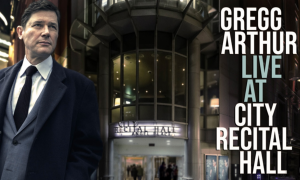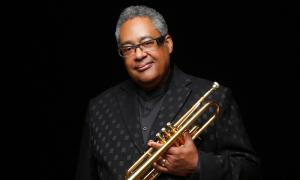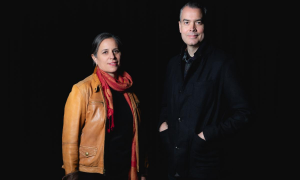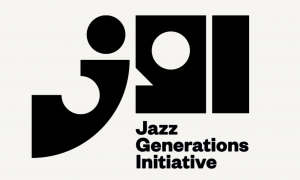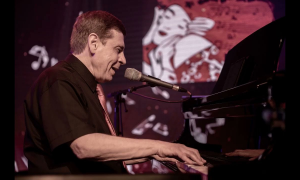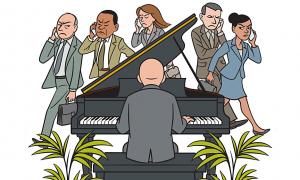By Pico
If blogs had been around in the late 70s or the 80s I wouldn't have thought for a second to write about Keith Jarrett's watershed album The Koln Concert, because every jazz enthusiast with a computer keyboard and a Blogger account would have already been flooding the internets with praise about this record. Three and a half decades after its 1975 recording and subsequent release, it remains the record people most identify with Jarrett, and in all likelihood, ECM Records' all time best seller. But enough time has passed to reflect again on the significance of this record, a timeless recording whose fame was nevertheless rooted in the timing of its release.
By the mid 70s, jazz was dominated by rock-jazz fusion. This sub-genre of jazz had gotten off to a terrific start, but eventually, much of it became over-composed, over-produced and full of bravado. What was gained in proficient musicianship was more than countered by the loss of swing, soul and substance. Sure, there were some notable fusion records of that era and many of them even raved on here, but increasingly, jazz-rock was offering little to offer over what you could get from rock itself. Some of jazz' most respected players like Jackie McLean, McCoy Tyner and Dexter Gordon stubbornly stuck with acoustic post-bop jazz and paid the price by being driven into obscurity and in some cases, near poverty.
The first flicker of hope in the eventual resurgence of unplugged jazz came one day in January, 1975 when Keith Jarrett sat in front of piano in a Kln, West Germany opera hall and began to play melodies that didn't exist before that moment. A few years earlier, Jarrett had ironically been a soldier in the movement to rockify jazz as a member of Miles Davis' band for about 18 months from 1970 to 1972. It's a stint he's since disowned, and not long after he left, Jarrett became as likely to play any plugged-in instrument as Marie Osmond was likely to have a tryst with George Clinton. Around the time he was wrapping up his gig with Miles, he recorded his first solo piano--and ECM--record Facing You (1971) that while taped in the studio, paved the way for Koln a few years later.
Jaunty or reflective, soulful or swinging, Jarrett opened up his heart and played whatever notes felt right at the moment. Missing from the show was overly flashy displays of instrumental prowess; instead of being found playing the perfect lick, Jarrett chose instead to get lost in the melody. He used virtuosity to advance, get this, art instead of science.
The reaction to this recording is nothing like ECM or Jarrett had probably expected. After all, it went against the prevailing rules. It return an idiom to its basic values, in a sense, just when its public was ready for that kind of shift. It went by feel, not flash. Keith Jarrett did for jazz what the Ramones did for rock just one year later.
The Koln Concert didn't single-handedly bring jazz back to its roots; The Koln Concert isn't even a “jazz" record except in a loose sense. It took several more events to rekindle interest in acoustic and/or lighter jazz on a broader scale: the emergence of both Pat Metheny and Wynton Marsalis, among other things, finally swung the pendulum firmly back in the other direction. But Jarrett revealed a lot of untapped interest in both, as long as the music was honest and fresh. And thirty-five years later, The Kln Concert sounds as fresh and honest as it did when these songs were composed, in front of a live audience.
Purchase: Keith Jarrett - The Koln Concert
If blogs had been around in the late 70s or the 80s I wouldn't have thought for a second to write about Keith Jarrett's watershed album The Koln Concert, because every jazz enthusiast with a computer keyboard and a Blogger account would have already been flooding the internets with praise about this record. Three and a half decades after its 1975 recording and subsequent release, it remains the record people most identify with Jarrett, and in all likelihood, ECM Records' all time best seller. But enough time has passed to reflect again on the significance of this record, a timeless recording whose fame was nevertheless rooted in the timing of its release.
By the mid 70s, jazz was dominated by rock-jazz fusion. This sub-genre of jazz had gotten off to a terrific start, but eventually, much of it became over-composed, over-produced and full of bravado. What was gained in proficient musicianship was more than countered by the loss of swing, soul and substance. Sure, there were some notable fusion records of that era and many of them even raved on here, but increasingly, jazz-rock was offering little to offer over what you could get from rock itself. Some of jazz' most respected players like Jackie McLean, McCoy Tyner and Dexter Gordon stubbornly stuck with acoustic post-bop jazz and paid the price by being driven into obscurity and in some cases, near poverty.
The first flicker of hope in the eventual resurgence of unplugged jazz came one day in January, 1975 when Keith Jarrett sat in front of piano in a Kln, West Germany opera hall and began to play melodies that didn't exist before that moment. A few years earlier, Jarrett had ironically been a soldier in the movement to rockify jazz as a member of Miles Davis' band for about 18 months from 1970 to 1972. It's a stint he's since disowned, and not long after he left, Jarrett became as likely to play any plugged-in instrument as Marie Osmond was likely to have a tryst with George Clinton. Around the time he was wrapping up his gig with Miles, he recorded his first solo piano--and ECM--record Facing You (1971) that while taped in the studio, paved the way for Koln a few years later.
Jaunty or reflective, soulful or swinging, Jarrett opened up his heart and played whatever notes felt right at the moment. Missing from the show was overly flashy displays of instrumental prowess; instead of being found playing the perfect lick, Jarrett chose instead to get lost in the melody. He used virtuosity to advance, get this, art instead of science.
The reaction to this recording is nothing like ECM or Jarrett had probably expected. After all, it went against the prevailing rules. It return an idiom to its basic values, in a sense, just when its public was ready for that kind of shift. It went by feel, not flash. Keith Jarrett did for jazz what the Ramones did for rock just one year later.
The Koln Concert didn't single-handedly bring jazz back to its roots; The Koln Concert isn't even a “jazz" record except in a loose sense. It took several more events to rekindle interest in acoustic and/or lighter jazz on a broader scale: the emergence of both Pat Metheny and Wynton Marsalis, among other things, finally swung the pendulum firmly back in the other direction. But Jarrett revealed a lot of untapped interest in both, as long as the music was honest and fresh. And thirty-five years later, The Kln Concert sounds as fresh and honest as it did when these songs were composed, in front of a live audience.
Purchase: Keith Jarrett - The Koln Concert









